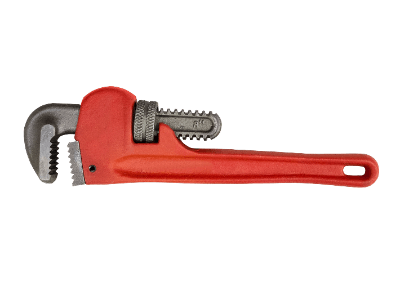What Is a Pipe Wrench?

A pipe wrench is a tool for turning or gripping a pipe or cylindrical object.
It typically has an adjustable serrated jaw that can tighten around a pipe and a long handle that acts as leverage for turning the pipe. Pipe wrenches are often used in plumbing and mechanical work to loosen and tighten pipe fittings and other connections.
They come in a variety of sizes and styles to suit different pipe diameters and applications.
Uses of Pipe Wrenches
Pipe wrenches are used in plumbing and mechanical work to grip and turn pipes and fittings. Adjustable serrated jaws provide a firm grip on pipes without slipping.
It can also apply a large amount of force to turn a pipe without deforming it. Besides, it is useful for removing rusted or stubborn fittings that cannot be turned by hand.
Principle of Pipe Wrenches
Pipe wrenches have jaws on the top, and bottom that can be adjusted perpendicular to the handle. They adjust to the size of the pipe and grip the pipe. Generally, the jaws are serrated with fine grooves to make it easier to grip the pipe and to prevent deformation.
The principle of a pipe wrench is the same as the principle of leverage. By using this principle, pipes and fittings can be easily tightened or loosened with little force. The long handle makes it possible to work efficiently.
Types of Pipe Wrenches
There are many types of pipe wrenches, each with its own specific shape and intended use. Common pipe wrench types include the following:
1. Straight Type Wrench
It has adjustable jaws that can be tightened or loosened by turning a round nut on the handle. The jaws are perpendicular to the handle and are designed to accommodate pipes of various diameters.
2. Corner Pipe Wrench
Also called angled pipe wrench or multi-angle pipe wrench, this type of wrench has jaws positioned at 90 degrees to the handle. It allows you to reach tight places and obstacles that straight wrenches cannot reach.
3. Chain Wrench
A chain is wound around a pipe or fitting, with a handle on one end and a hook on the other. When the handle is turned, the chain tightens around the pipe, providing a strong grip to turn the pipe.
4. Belt Wrench
Uses a flexible belt, rather than serrated jaws, to grip pipes and fittings. Designed for use on delicate and vulnerable pipes, such as plastic or chrome-plated brass.
How to Choose a Pipe Wrench
There are several important factors to consider when choosing a pipe wrench.
1. Size
Pipe wrenches come in a variety of sizes, but are generally 300 mm or 400 mm in length; 300 mm wrenches are used for pipes with outside diameters from 10 mm to 32 mm, and 400 mm wrenches are used for pipes with diameters from 26 mm to 52 mm. Select the Pipe Wrench appropriate for the size of the pipe or fitting to be worked on.
2. Type
There are various types of pipe wrenches, each of which has its own purpose. Think about the specific type of work to be performed and select the appropriate type of wrench for that work.
3. Material
The wrench should have a strong jaw for a firm grip without slipping and be made of high-quality materials, such as iron or aluminum.
4. Comfort of Use
The design of the handle, grip, and weight should be easy to use. An easy-to-use wrench is easier to use for extended periods of time and helps reduce hand and wrist fatigue.
It is important to choose a pipe wrench that is suitable for the task, of good quality, and comfortable to use. Choosing the right wrench will help you to perform your work accurately and efficiently.